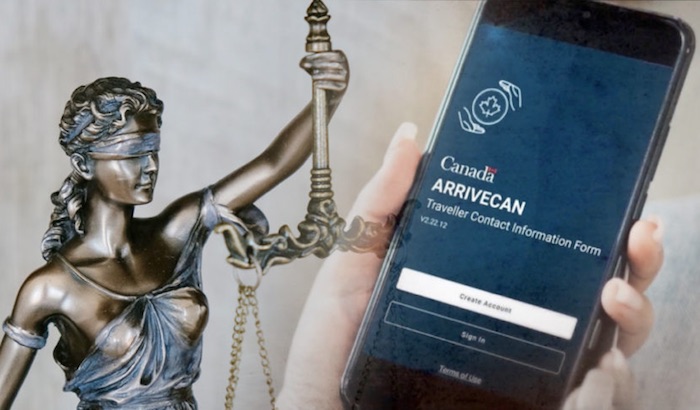TORONTO: The Justice Centre filed a lawsuit today in the Federal Court of Canada, on behalf of 11 Canadians either fined for not using the ArriveCAN and/or ordered to quarantine for 14 days after returning home from abroad. The Applicants involved in this legal challenge have received fines of up to $8,500 each and been forced to disclose private medical information via ArriveCAN. The legal challenge seeks to strike down the mandatory use of ArriveCAN and declare unconstitutional the 14-day quarantine requirements for Canadians who refuse to use ArriveCAN when returning home.
ArriveCan was initially implemented in April 2020 to force Canadian citizens returning home to submit quarantine plans due to Covid. It was mandated for air travellers November 21, 2020. In February 2021, the federal government mandated ArriveCan for all land travellers, while the US-Canada land crossing was still closed. After the Covid vaccine rollouts, travellers were required to upload their vaccination certificates onto the ArriveCAN app.
Mr. Matthew Leccese, one of the applicants, went to the United States for 25 minutes to pick up some parts for his vehicle. Upon his return, the Canadian Border Services Agency (CBSA) demanded that he submit his vaccination certificate via ArriveCAN. Mr. Leccese refused because he had privacy concerns with ArriveCAN, but offered to present his vaccination certificate. CBSA refused to accept his paper certificate and issued him a ticket for $7,210 for not using ArriveCAN.
Mr. Alexander Macdonald, another applicant, attempted to cross the U.S. border in April 2022. He was refused entry by U.S. border agents and was allowed to return to Canada without issue. He tried to cross the U.S. border again in July 2022 and was again denied entry and returned to the Canadian side of the border. This time a CBSA agent ordered Mr. Macdonald to download ArriveCAN and submit to the 14-day quarantine despite never having set foot in the U.S.
Ms. Amanda Yates returned to Canada via a land crossing. Her husband used ArriveCAN on their behalf, but a glitch in the system sent them to secondary screening. She refused to disclose her vaccination status and was fined and required to quarantine for 14 days. Her husband did disclose his vaccination status, and was not required to quarantine, despite living in the same house with Ms. Yates.
A glitch with ArriveCAN sent an automated message to over 10,000 vaccinated Canadians, requiring them to quarantine for 14 days. It took the government 12 days to inform the affected individuals that the app had malfunctioned.
ArriveCAN continues to come under heavy criticism for creating massive delays at international crossings. In July 2022, Toronto Pearson International Airport ranked number one worst airport in terms of delays and there were also significant delays reported at Montreal Pierre Elliot Trudeau International Airport.
The Minister of Transport has defended ArriveCan as vital in preventing the spread of Covid despite evidence that vaccines cannot stop transmission or infection. The minister also claimed ArriveCAN has not caused the ongoing travel backlog, despite evidence that the CBSA agents have stated it is in fact causing delays.
The Justice Centre has filed a Notice of Application against the federal government and is awaiting a trial date.
“The Justice Centre has heard from thousands of Canadians who have been negatively impacted by the federal government’s mandatory requirement to use ArriveCan. Thousands of law-abiding citizens have been fined egregiously simply for returning to their home country. The differential treatment and discriminating between vaccinated and unvaccinated travellers also defies science, which the federal government claims to follow,” says Eva Chipiuk, a lawyer on this case.



















